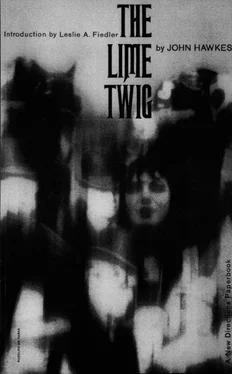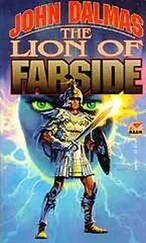“Take off his shoes, Cowles. Carefully, if you please.”
Cowles did as he was told, the dark coat flapping down over his hands at the laces, while the others — the radio was on the floor, a chair scraped — moved all together toward the bed. Sparrow, at such moments, was in the habit of shutting his eyes, whether instantly crippled in a picture palace, the Majesty, or in the Men’s, whether caught in Daphne’s Row or in the room with tables and dirty silverware. He was closing the lids now. They lowered, one or two lashes in each, slowly obliterating the eyes, which were white and without tears. A single lick of black hair lay on his forehead.
They were all at the bed, Thick and Larry on either side of the pillow with Little Dora and Cowles — he was still holding the empty shoes — and their expressions were unchanged even by Sparrow’s moans. Margaret and the little girl came also, stood in the vicinity of Sparrow’s heart and lungs.
From his great height, drawing back his coat flaps and lapels so that the gun and the gun’s girdle — the holster, straps, strings — were visible, slowly putting his hands in his pockets, Larry spoke the name, Larry who had been the first to carry him the night he screamed, who had sipped tea out of a tin cup while watching them give preliminary treatment to the broken legs, and who had known immediately upon sight of the buttocks tiny and gnarled that the injured man was a rider: “Sparrow.” And Larry, who had greased his hair even in battle, was still compassionate. “Sparrow,” he said again and the moaning stopped, the perspiration appeared, the slit eyes began suddenly to tighten and grow shrewd.
“Dead and dying,” came Sparrow’s answering whisper at last, and the wrists twisted in the enormous cuffs.
“Now then, Thick,” said Larry, “roll up his sleeve.”
Sparrow grimaced and all the while kept the round vague outline of Margaret’s face in his filmy sight. Larry took the tin packet from inside his coat, from just beneath the armpit’s holster, and opened it. He fitted the needle to the syringe, broke the neck of the ampule, drew back the plunger until the scale on the glass measured the centimeters correctly. The tip of the needle dribbled a bit. He had tended to Sparrow in alleys, bathhouses with crabs and starfish dead on the floors, in doorways, in the Majesty, and the back of horsedrawn wagons on stormy nights. He had jabbed Sparrow in the depths of a barroom and upright in the booth of a phone; once on rough water with the rain beating down, once in a railway coach with his ministrations hidden from the old ladies behind a paper. Once too in the dark of a prison night, and many times, on leave, with some strange fat girl wearing rolled stockings, or with a tall girl carrying her underclothes in a respirator bag, standing idly by and swinging the bag, pulling the rolled elastic, watching. As often as Sparrow fainted, Larry revived him. Whenever Sparrow could stand on his feet no longer, whenever he went down in the crooked swoon, helpless as when he had first screamed from his bloody blankets — he had won a fiver from the kid of the battalion only that sundown — Larry the angel, the shoulder man, who later drowned the operator of the half-track in a shell hole filled with stagnant water and urine of the troops, took him up in his arms as carefully and coolly as a woman of long service. And with the needle and morphic fluid calmed him, standing then in suspect shadow, smoking, until Sparrow should rise, muttering, “Shivers and shakes,” and proceed with his drugged and jittery step to a brief meal or to the job.
“This ought to do it,” he said, and leaned forward, pinched as much of the flesh on Sparrow’s arm as he could into a chilly blister. Then he punctured it, slid the needle beneath Sparrow’s skin, gently pushed down the plunger. For a moment he could see the fluid lying like a pea just under the skin, then suddenly it dropped into a duct or into the mouth of a vein and was gone. He withdrew the needle and there was a tiny heart of blood on the tip of it. He watched, and in the middle of the tattoo — a headstone with “Flander’s Field” in scroll beneath it — his pinch marks and the nick of the needle were still visible. He was casting a long shadow across Sparrow’s torso, and the substance of his own head, the lines of his shoulders — constructed to catch a man’s love for master tailoring — these lay lightly on the man in his agony. Then he looked across to Thick, who was stooping also and hiding his mouth behind a hand, keeping an eye on the bare needle. Thick’s own forehead was trickling.
“He ain’t going to need a transfusion … is he now, Larry?”
“Cover him with a sheet, for God’s sake, and let’s go,” said Little Dora, and dug with mannish fingers into her stuffed side.
“Michael was sick once,” whispered Margaret, and she was kneeling.
But this was not Sparrow’s worst. Nor was it Daphne’s Row or escaping in the manure wagon or trying to fix the needle behind the newspapers that time on the rocking train that had caused Larry himself to sweat and think of summoning the doctor who was bald and unlicensed and the best in the business for a man who had been stabbed or shot in the groin. None of these, but the time in the hock and antique shop — when the black cars passed up and down in front of the cluttered window and Sparrow had collapsed on a scabrous tiger skin, pulling a tea set with him and falling with his mouth jammed into the heel of a brass boot and he, Larry, had tried to squat beside and reach for him through a pile of bone and silken fans. His knee had crushed an old bellows and dust fell all about them, while paper weights rolled against the tiger’s head. He had crouched there over Sparrow and had torn the tin packet. And a parrot in the back of the shop kept screaming, “Piss in his eye, piss in his eye!” from a great fortress-shaped wire cage. And while the cars hunted them up and down the street, while the parrot shrieked, he had freed Sparrow’s arm from the cloth and had been too hasty, then, withdrawing the point, so that the needle broke, and the skin immediately turned blue. But even that day he had managed, watched Sparrow’s cheekbones recede under a little color, helped him to crawl through the tunnel of Spanish shawls and so to escape, and had killed the parrot by stuffing his handkerchief into its shocked and gloomy face. Dragging Sparrow away he had heard the cage still swinging.
“That will do, I imagine,” he said, and straightened. But no one else moved. First one, then by twos and threes the playing cards blew off the table and swished to the floor or landed on edge with tiny clacking noises, all face down except the queen. Thick wet his lips; Little Dora lifted back her veil; Cowles was biting his nails. Monica blinked her green and fearful eyes and Sparrow from the bed was sighing.
“Better now, Sparrow? Come along then. …”
“Wait!” said Little Dora. “You don’t mean you’re going without me, Larry! You wouldn’t leave Little Dora behind! Not another day in the Roost. And I thought I’d be out today and have a throw and a lunch at the Pavilion. Ain’t I going to get a finger in the Golden Bowl at least? Or at least a look at the Bumpy Girl? What the hell, I’m no matron. …”
But Larry opened the door a crack. “She wants watching, Dora.” And, bracing Sparrow, raising his head slightly: “Use the ropes if you need to. Thick.”
The door closed and Margaret remained kneeling at the empty bed. Little Dora tore off her gloves. Thick began to laugh.
There was a railing and Michael Banks took hold of it, then stared down into the darkness of five broad swinging doors. He was quite alone when he pushed through one of them. Underneath the grandstand and at the bottom of the steps he found ahead of him the empty reaches of the public lavatory — low ceiling, fifty feet wide and of concrete painted black and tiny brick cubes washed with a light-green color. There were a few bulbs in cages waist high between the urinals and toilet bowls. It was the rank darkness of the empty Tube; a man could hide even at the base of one of those toilets if he crouched low enough, made himself small.
Читать дальше












